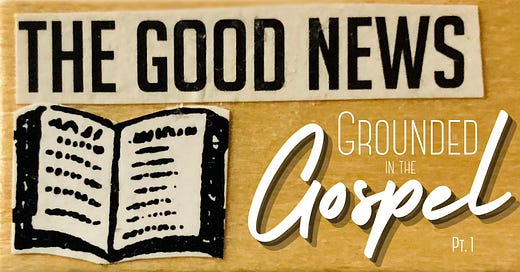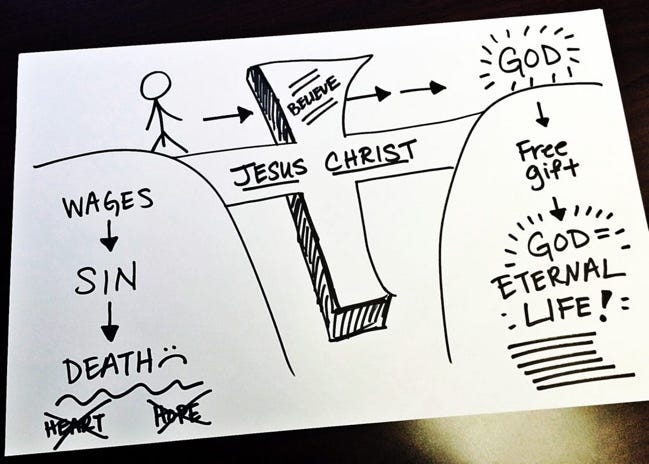The Gospel is the good news about what God has done to save us through Jesus Christ. Okay, but what is it? What’s the news? Why do we call it good? Where does the word “Gospel” come from? These are important questions, for non-Christians, new Christians, and for long-time Christians because the Gospel is central to Christianity. It is the core of the faith.
Even though the Gospel is vitally significant, sadly, many people and churches don’t treat it as such. Hearing the Gospel nowadays is actually rare. It doesn’t help that many Christians and even pastors misunderstand what the Gospel is, or only share bits and pieces. Your pastor at church on Sunday might reference the Gospel or even talk about the Gospel in a sermon, yet still fail to explain what it is. Similarly, it’s common for pastors to not communicate the Gospel on a regular basis in their sermons.
So, because the Gospel is at the core of following Jesus and yet so neglected/misunderstood, we will be kicking off the content here at Bridging the Bible with several articles clearly explaining what the Gospel is. We will look at the Gospel from multiple angles, not to make the Gospel complicated in your mind, but to show its simplicity and depth. The Gospel is simple, but it’s also deep.
In this first article, part one, I will briefly frame what the Gospel is, weave in a bit of my personal story, and I will conclude by introducing what the essential elements of the Gospel are. Here is a sneak peek at some of the future articles to come in this series of articles which I have called Grounded in the Gospel:
The heart of the Gospel: God’s undeserved love and transformative grace.
Whether or not you have to clean up your act first to become a Christian.
The Gospel is more about Relationship than it is about heaven.
Seeing the Gospel in the Old Testament.
The most common false gospels to avoid.
This series should be quite refreshing! I think you will be blessed. I’m excited to discuss the Gospel in deep yet practical ways with you. Even if you’ve been a believer a long time, you might be invigorated by this multi-faceted approach to the Good News. Okay, enough introduction, let’s begin!
So, what exactly is the Gospel and why is it so important in the first place?
Introduction to What The Gospel is
The Gospel is the good news about what God has done through Christ to save us. The Gospel is news. It is the announcement or report of who Jesus is and what He accomplished on your behalf. This news is good because we humans are in a bad situation. We are sinners in need of being reconciled to God. Thankfully, God made a way for us to have a restored relationship with Him. The way we can do that is through trusting Jesus by faith. So, it is news that is good. The word “Gospel” literally means “good news.”
The word “Gospel” is kind of a weird word. I capitalize it out of reverence because I think it should be capitalized. I capitalize it for the same reason we capitalize “God”, or “Jesus,” or “Lord.” The word “Gospel” is an English term that has its roots in Old English. Old English is the ancestor language of modern English. Old English was spoken and written in England from around the fifth century to the eleventh century. The word “Gospel” comes from Old English.
The New Testament was originally written in Greek. The Greek word euangelion (pronounced yoo-ang-ghel'-ee-on) literally means “good news,” and in most English translations it is translated as “Gospel.” Euangelion = good news = “Gospel.” This Greek word is where we get the words “evangelize” and “evangel” from. “Evangel” is just another English word that means the same thing: good news. To “evangelize” is to share this good news with someone.
When Someone Shared the Good News With Me
The first time I heard this good news was back in 2014 as a twenty-one-year-old college student while I was meeting with my new friend, pastor Brian, in the coffee shop of my college’s student center. Brian pastored a small church twenty minutes away from school and would drive to campus and meet with me regularly. I met Brian for the first time at his church on a Sunday because the girl I had a crush on at the time was attending there (funny how the Lord works). During one of our first coffee times together on campus, Brian started drawing a diagram on a piece of paper and started explaining some things to me. That hand-written diagram looked something like the picture you see here.
It was all news to me. I had never heard what Jesus did on the cross. I had not known that my relationship with God up to that point was broken in need of repair—which had eternal ramifications. I had not known that Jesus’ death and resurrection needed from me a response of faith, so that I could be forgiven and have a relationship with God that would go into eternity. I did not know.
Brian evangelized to me. My life has never been the same since.
I spent the next semester learning about Christianity by spending time in Christian groups, attending Bible studies and events, and by being an open-minded sponge. Then, one month before I graduated, I was studying late at night in our school library on the third floor. At around midnight it felt like time all of a sudden stopped. I had this realization or awareness that I had not yet placed my trust in Christ and that’s what God wanted me to do right then and there. So that’s what I did. I had a sincere heart, and I communicated my heart to God while sitting at that library study table. I wrote down in my journal what I did and what was in my heart: “I just truly whole-heartedly committed my life to Jesus Christ, my Savior, who died so that I could be saved. I have hope because of Him. It won't be easy, but let the walk with God begin. I am putting all my trust in you God. It's a new life. Thank you. Amen.”
I didn’t know much. But I knew I belonged to God now. I knew I had a heavenly Father who loved me, which made me want to get to know Him. And that’s all that mattered.
I was not going back to the old life.
The Gospel Has The Power to Save
In hindsight, hearing the Gospel for the first time was like a balloon that popped. Something happened. Something was released. I started considering mighty truths that previously I was clueless about. I started thinking about myself, others, and God differently. It was as if my head was lifted out of sand, and there I stood looking at the sand, and looking around me trying to make sense of the new surroundings. What happened was I heard the Word of God. The Word of God does mighty things.
The Bible talks about how “faith comes from hearing, and hearing through the word of Christ,” (Romans 10:17, emphasis mine) which is preached by people who are sent to share it to others so that they can believe in the Lord (Romans 10:14-17). The apostle Paul—who wrote the letter to the Romans—wrote towards the beginning of the letter that he was “not ashamed of the Gospel, for it is the power of God for salvation to everyone who believes…” (Romans 1:16, emphasis mine). In another letter—this time to the Corinthians—the apostle Paul wrote, “Now I make known to you, brothers and sisters, the Gospel which I preached to you, which you also received, in which you also stand, by which you also are saved, if you hold firmly to the word which I preached to you, unless you believed in vain,” (1Corinthians 15:1-2, emphasis mine).
The Gospel contains in it the truth that provides us what we need in order to become a Christian, in order to be saved. This doesn’t mean that people automatically get saved if they are told the Gospel. People reject the Gospel, and others like me need time to wrestle with it. What it does mean is whoever is saved—whoever is a Christian—is so because of the Gospel. The truth about what God has done through Christ on the cross is the essential ingredient. The secret sauce of the Gospel—the stuff that is released into the atmosphere when the balloon pops—is the Word of God. It is truth according to God Himself. This truth is alive and active (Hebrews 4:12) and therefore able to make someone wise for salvation through faith in Christ Jesus (2Timothy 3:17).
The Gospel has the power to save because faith comes from hearing the Word of God. This is why the Gospel is so important. The Gospel contains several truths or realities that are essential to the process of someone becoming a born-again child of God. I have alluded to them somewhat already, but we can frame them in terms of good news…news that is good.
This news is historical (rooted in historical facts) and is theological (spiritual interpretation of those facts). These four elements of the good news will be the subject of the next article in this series I have called Grounded in the Gospel.
About the Author
Colin Rieke is a regular guy whose life was really messed up before finding wholeness in God’s grace through Jesus Christ. Colin is a writer/podcaster, loves having conversations with people about truth, and aspires to be a vocational pastor-theologian. Colin reads theology, church history, and biblical counseling books in his spare time for fun, and he is passionate about offering biblical solutions to people’s real life challenges so that they live healthy lives transformed by God’s grace. Colin became a Christian as an adult around the time he graduated from college with a BA in Philosophy, then he met his wife Rachelle at church, and they got married in 2016. Colin graduated from Phoenix Seminary with an MA in Christian Ministry in 2025.








